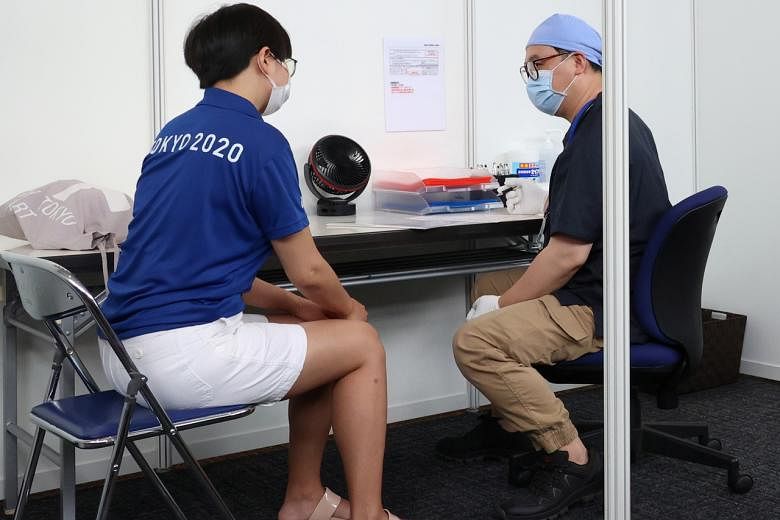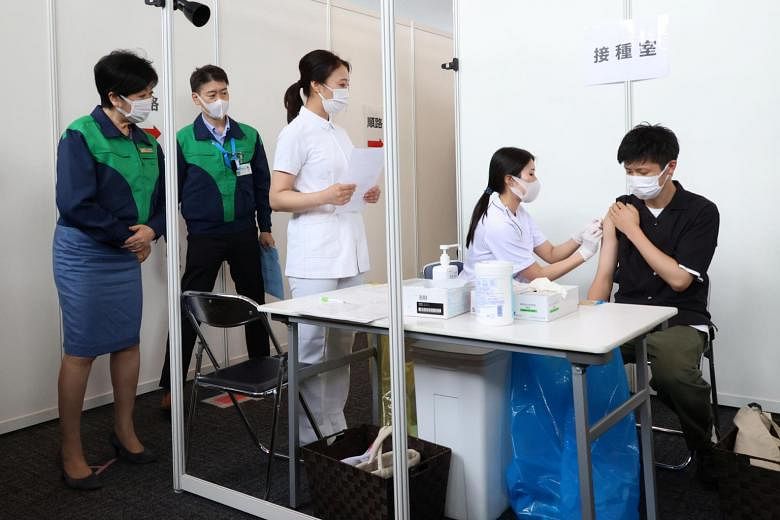TOKYO (AFP) - Thousands of Olympics volunteers and officials began receiving vaccines in Tokyo on Friday (June 18), five weeks before the Games begin, as experts warned it would be safest to hold the event without fans.
With just over a month until the July 23 opening ceremony, the organisers are in the home stretch and scrambling to finalise virus rules and get participants vaccinated in time.
They also face a controversial and difficult decision over how many domestic fans, if any, will be in the stands for the pandemic-postponed Games.
Japanese Olympic athletes have already begun receiving vaccines, and the roll-out expanded on Friday to Olympics staff, volunteers and others who will interact with overseas participants.
The International Olympic Committee has donated enough Pfizer/BioNTech doses for 40,000 people, including airport staff, the local media and Olympic referees.
Ms Chika Hirai, director of doping control for Tokyo 2020, was among those being vaccinated on Friday and said she had some niggling concerns about virus risks before getting jabbed.
"Now that I will be vaccinated, I will feel a little more reassured doing my job," she told reporters.
"Many people from abroad, including inspectors from my field, are coming to Japan after having been vaccinated themselves. I feel more relieved that we also won't be the source of the virus spread."
The jabs are separate from those being used in Japan's national vaccine roll-out, which began slowly but has picked up pace lately, with over 6 per cent of the population now fully inoculated.
The vaccinations come as organisers work to convince a sceptical public that the biggest international event since the pandemic began will be safe.
This week they have rolled out new virus rule books, warning athletes they could be barred from the Games if they violate regulations on mask-wearing or daily testing.
But they face a difficult decision over whether to allow spectators into the stands, with a group of leading medical experts who advise the government saying on Friday a closed-door Games would be safest.
"Having no spectators would create the least risk in terms of the spread of infections inside venues, so we think this would be ideal," they wrote in a report submitted to Tokyo 2020 organisers and the government.
'Stricter standards'
The number of fans at the Games will be limited by government virus measures, which in Tokyo currently cap spectators at 5,000 people or 50 per cent capacity, whichever is smaller.
That rule is scheduled to stay in place until July 11, even though a virus state of emergency will end on Sunday.
After July 11, the cap will be raised to 10,000 people or 50 per cent capacity but the experts urged Olympic organisers to "impose stricter standards" if they allow fans.
They also want limits on spectators from outside the area.
And they warned that the organisers should be prepared to reverse course and ban fans if the infection situation or pressure on the medical system worsens during the Games.
A final decision on local fans is expected next week, with local media reports saying a 10,000-person cap was most likely.
Overseas fans have already been barred from attending for the first time in Olympic history, as the organisers try to tamp down infection fears.
Tokyo 2020 said Friday it has further slashed the number of overseas participants coming to Japan for the Olympics and Paralympics to 53,000, not including around 15,500 athletes.
That is down from original plans for 177,000 people, including officials, sponsors and the media, they said.
Tokyo 2020 also said it had received offers from more than 100 overseas volunteer medical staff.
The foreign volunteers facilitated by the IOC are meant to help ensure the Games do not place extra pressure on Japan's medical system.












